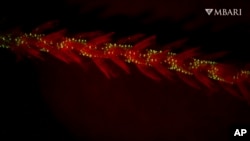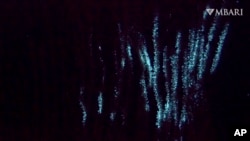A new study suggests ancient corals found deep in the ocean were the first animals to glow in the dark. To glow means to shine a steady light.
Many animals, insects and sea life have the ability to glow. But a study from biologists based in the United States suggests corals started glowing 540 million years ago.
Andrea Quattrini is curator of corals at the Smithsonian Museum of Natural History in Washington, D.C. She was one of the writers of the study. Quattrini said the ability to light up helps creatures living in the deep-sea to communicate.
“It’s very important in deep waters,” Quattrini said.
The new study recently appeared in the publication Proceedings of the Royal Society B.
Scientists know about many ocean animals that light up, including fish, squid, octopus, jellyfish and even sharks. The ability to glow is called bioluminescence, it comes from a chemical reaction.
Some animals use the light as protection. Others use it to find a mate.
Steven Haddock is another study co-writer. He is a marine biologist at the Monterey Bay Aquarium Research Institute in California. He explained that scientists used a paintbrush attached to an underwater vehicle to lightly touch the luminous coral. Haddock said the coral, when touched, begins to glow pink, orange, white, blue and purple.
Danielle DeLeo is another study co-writer and a marine biologist at the Smithsonian. She said in some kinds of coral, the whole body glows. In others, “only parts of their branches will glow,” she said.
Scientists do not fully know the function of the glowing for coral. They do not know if it is meant to attract or keep away certain organisms, or possibly both. But DeLeo said the fact that corals light up so often means that the glowing serves a critical function.
It is one thing to try to learn about why the corals light up. But how did the researchers determine that coral had been glowing for over 500 million years?
To answer the question, the scientists built a family tree using genetic data from 185 species of glowing coral. They decided the common ancestor of all the glowing coral lived 540 million years ago and could glow just like the current coral.
Before this research, marine scientists believed the earliest example of a glowing sea creature was a shrimp that lived about 270 million years ago.
Coming up with an age of the earliest glowing coral helps add more information to the timeline of the development of life on Earth. The oldest glowing coral is now placed in the time of the Cambrian explosion, when life on Earth developed quickly.
I’m Dan Friedell.
Dan Friedell adapted this story for Learning English based on a report by The Associated Press.
_____________________________________________
Words in This Story
curator –n. a person who watches over something or keeps things in order
branch –n. the part of a plant or tree growing off the main stalk or trunk
determine –v. to think about something in order to reach a conclusion
We want to hear from you. Have you seen glowing sea life? Where were you?














Forum